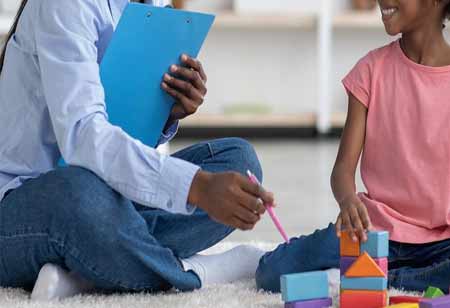Play Therapy Techniques to Help Your Children
Children ages three to twelve are best suited for play therapy. Play therapy may also help older kids and adults with some cognitive problems. Play therapy is a sound early intervention strategy for younger kids and even newborns.

By
Medical Care Review | Tuesday, August 20, 2024
Stay on top of your health and well-being with exclusive feature stories on the top medical clinics and treatment centers, expert insights and the latest news delivered straight to your inbox. Subscribe today.
Children ages three to twelve are best suited for play therapy. Play therapy may also help older kids and adults with some cognitive problems. Play therapy is a sound early intervention strategy for younger kids and even newborns.
Fremont, CA: Play therapy is a broad phrase that refers to various therapeutic approaches that use play as a strategy. The therapist facilitates your child's autonomous work, helps them think through their problems, and helps them solve them. By creating a psychological barrier between your child and their issues, play therapy aims to make them feel comfortable. A
Using play in a therapeutic context involves more structured play with a purpose for the activities. While making your child feel at ease, play enables a therapist to expand on the fundamental learning processes they already possess.
If you've ever witnessed a toddler throw a fit, you know that even very young children may have strong emotions. However, their proficiency in expressing their needs and feelings still needs to be improved. Play therapy provides a way to communicate without words when something is upsetting.
Toys serve as instruments for your youngster to replace words during play therapy. Your child's therapist can assist you in learning how to adjust to new circumstances and spot social or emotional deficiencies in your child. Frequently, play therapy serves as a remedial experience that counteracts your child's annoyance and offers the chance for recovery.
Nurturing Play
If you've ever witnessed a toddler throw a fit, you know that even very young children may have strong emotions. However, their proficiency in expressing their needs and feelings still needs to be improved. Play therapy provides a way to communicate without words when something is upsetting.
Aggressor-Victim Play
It indicates that your child is unable to manage their everyday lives if they throw away all their toys or create a mess instead of playing. They might demonstrate that they are expressing rage or establishing control by throwing the toys or making a mess.
Sorting or Fixing Play
If your child tries to organize or arrange toys in a specific sequence, they want order in a chaotic world. They demonstrate that they desire to be in charge or determine how things should be.
Sleep Play
If your kid puts their toys to bed or loves to pretend to play, they can exhibit overloaded emotions. It's possible that your child needs a respite or a way out of a scenario. On the other hand, it is beneficial to play out sleep during the day for those who suffer from separation anxiety at night. In bed or at night, your child may occasionally act out something that happened to them.







